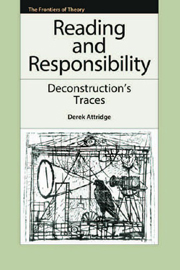Book contents
- Frontmatter
- Contents
- Acknowledgements
- Series Editor's Preface
- Introduction
- 1 Derrida, Deconstruction and Literary Criticism
- 2 Deconstruction Today: Literature, Postcolonialism and the Secret
- 3 Following Derrida
- 4 The Impossibility of Ethics: On Mount Moriah
- 5 Arche-jargon
- 6 Deconstruction and Fiction
- 7 Posthumous Infidelity: Derrida, Levinas and the Third
- 8 Roland Barthes's Obtuse, Sharp Meaning and the Responsibilities of Commentary
- 9 Nothing to Declare: J. Hillis Miller and Zero's Paradox
- 10 Radical Atheism and Unconditional Responsibility
- 11 The Place of Deconstruction: A Conversation with Jean-Michel Rabaté
- Bibliography
- Index
5 - Arche-jargon
Published online by Cambridge University Press: 12 September 2012
- Frontmatter
- Contents
- Acknowledgements
- Series Editor's Preface
- Introduction
- 1 Derrida, Deconstruction and Literary Criticism
- 2 Deconstruction Today: Literature, Postcolonialism and the Secret
- 3 Following Derrida
- 4 The Impossibility of Ethics: On Mount Moriah
- 5 Arche-jargon
- 6 Deconstruction and Fiction
- 7 Posthumous Infidelity: Derrida, Levinas and the Third
- 8 Roland Barthes's Obtuse, Sharp Meaning and the Responsibilities of Commentary
- 9 Nothing to Declare: J. Hillis Miller and Zero's Paradox
- 10 Radical Atheism and Unconditional Responsibility
- 11 The Place of Deconstruction: A Conversation with Jean-Michel Rabaté
- Bibliography
- Index
Summary
I have a problem with jargon, or rather with its absence. Like some stern deity, a comrade-in-arms of Duty and Conscience, the figure of Lucidity hovers threateningly above my computer screen, issuing imperatives, interfering with my progress, driving me back over my prose to revise and elucidate. ‘Is it clear?’ ‘Will they see what you mean?’ ‘Do you know what you mean?’ are questions that haunt my every keystroke. And perhaps it's out of envy that I'm drawn to writers who seem less bound to this tyrant's remorseless wheel – modernists in literature, Continentals in philosophy, deconstructors in criticism.
As a slave, I inevitably harbour suspicions about my master and frequently murmur rebelliously as I rewrite a sentence for the tenth time. What's the source of this power, exercised over me as a force in need of no justification? Psychologically, in terms of my personal history, I can make some guesses; but the question is more interesting as a philosophico-politico-cultural one. This demand for clarity, perspicuity, accessibility, this attack on jargon, hermeticism, technical language: what's at stake here, for assailants and victims?
It goes without saying that shall try to deal with this question as lucidly as I can.
Most of those who use the word ‘jargon’ would probably acknowledge, at least after calm reflection, that it is not a neutral term, objectively naming a certain kind of discourse.
Information
- Type
- Chapter
- Information
- Reading and ResponsibilityDeconstruction's Traces, pp. 78 - 88Publisher: Edinburgh University PressPrint publication year: 2010
